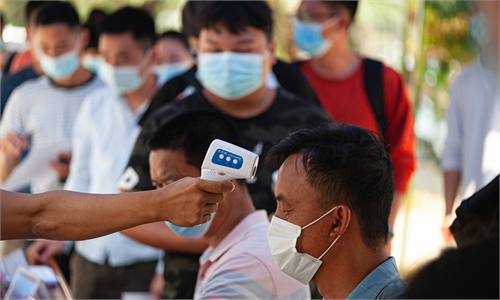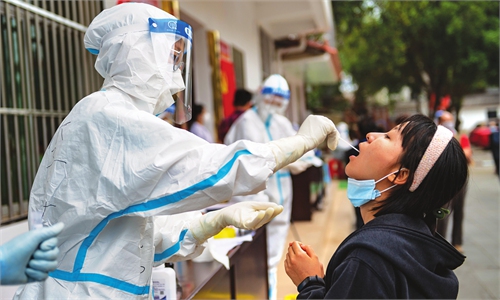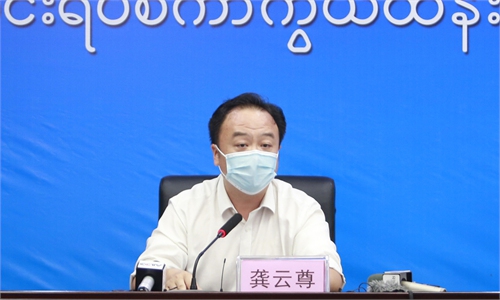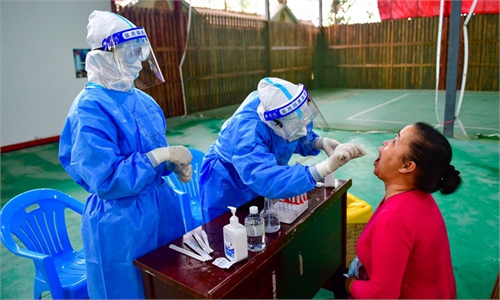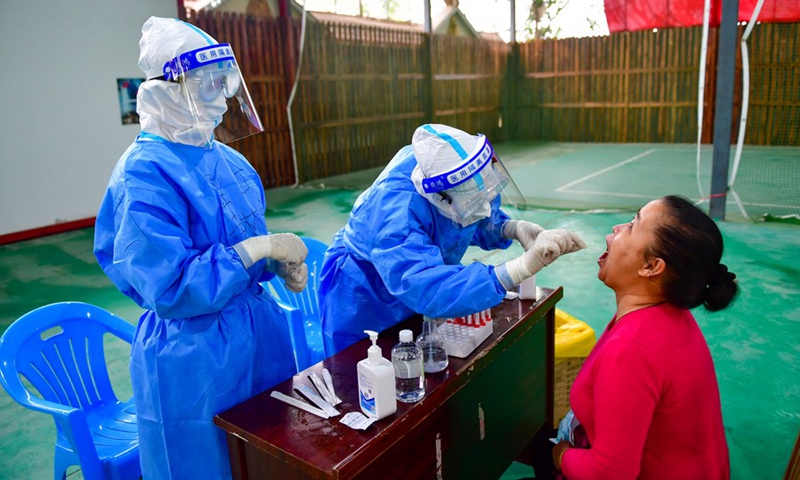
A medical worker takes a swab sample from a woman for COVID-19 testing at a testing site in Ruili City, southwest China's Yunnan Province, April 6, 2021.(Photo: Xinhua)
Ruili, a city in Southwest China's Yunnan Province bordering Myanmar, announced a level-3 emergency response and imposed a lockdown on Monday after three new domestic COVID-19 cases were reported on Sunday.
This marks the fourth time the city has been hit by the COVID-19 epidemic, and its third time imposing lockdown measures to contain resurgence. Observers said that the long border and the Delta virus strain that is widespread among South Asian countries may have contributed to the epidemic resurgence in Ruili.
Among the three domestic COVID-19 cases, two are Chinese nationals and one is Myanmar national, the Health Commission of Yunnan Province said in a statement on Monday.
The health authorities also reported one asymptomatic patient who is a Chinese national from Indonesia, as well as five imported cases, with three of whom from Myanmar and two from Indonesia.
Ruili gives nucleic acid tests to its residents regularly and mass testing is conducted in groups of five. The three domestic COVID-19 cases were identified in the regular mass testing, the Global Times learned from a government source in Ruili on Monday.
Upon identifying the domestic cases, Ruili quickly launched a public health emergency level-3 response and closed outbound channels, an official from Ruili told reporters on Monday at a press conference.
The official said that Ruili will go all out to conduct an epidemiological investigation and comprehensive tracing of the movements of the three confirmed cases and their close contacts and sub-close contacts within 14 days.
The government source in Ruili told the Global Times that the mutated virus strain Delta was detected after a gene sequencing of five recent imported COVID-19 cases. Those five were engaged in cross-border telecom fraud cases. However, it is unknown whether those three new domestically infected patients are carrying the Delta strain as well.
But the government source said that it's unlikely the resurgence was caused by illegal border crossings as the border has been closed off. Local Party officials and militias were mobilized to guard every one of the villages along the border.
Residents in China and Myanmar have frequent social and business exchanges, which pose a challenge for epidemic prevention and control. This could be one of the key reasons for frequent epidemic flare-ups in Ruili because border control is an arduous task in nature, Wang Guangfa, a respiratory expert at Peking University First Hospital, told the Global Times on Monday.
Ruili and Myanmar share a 170-kilometer border. Ruili, a city with 210,000 permanent residents, is the China-Myanmar port with the largest flow of people, vehicles and goods. In 2019, Ruili's checkpoints cleared a total of 20.63 million people, accounting for almost half of the inbound and outbound traffic in Yunnan Province.
Epidemic flare-ups in Ruili are also closely related to the surging cases in neighboring countries.
"Whereas a respiratory disease should develop in a downward curve during the summer, the epidemic in South Asian countries is the opposite. Those South Asian countries are battling against the Delta virus strain from India, which is stronger in transmission," Wang said.
Wang said that the possibility of imported cases who had finished their 14 days of quarantine and then transmitted the virus to others is low. The phenomenon of reinfected COVID-19 patients causing new infections to others is also rare.
It is difficult to strictly guard against imported cases along the long and complicated border over prolonged periods. So it is understandable that sporadic imported cases have occurred, Zeng Guang, chief epidemiologist at the Chinese Center for Disease Control and Prevention, told the Global Times in an earlier interview.
Mangshi, a county about 100 kilometers from Ruili, had arrested a villager in June for smuggling people across the border using his motorcycle.
The airport in Mangshi county planned to handle 70 flights in and out of the airport on Monday. As of Monday afternoon, 13 flights had been canceled due to the latest epidemic, with a cancellation rate of 18.57 percent.
The Global Times learned that the residential areas of the confirmed patients were closed off, but people could still move freely in the rest of the city because many residents had received COVID-19 vaccines.
Ruili was among the first cities in China to use the method of expanding COVID-19 vaccines to contain the surging epidemic. Yunnan Province had completed its first and second phases and entered its third phase of vaccinations, with the vaccination rate reaching 68.78 percent, the Yunnan Daily reported Sunday.
The border regions were one of the first to receive vaccines in China. As the country continues to ramp up its inoculation drive, more than 1.3 billion doses of COVID-19 vaccines have been administered as of Sunday.
The city has started nucleic acid tests for all its residents, which are expected to be completed by Tuesday.
Starting at 8 am on Monday, nobody may leave or enter Ruili unless deemed necessary, the city's COVID-19 prevention and control work command center said in a statement on the city government's website on Monday.
The Jiegao Bridge, which links China and Myanmar, was temporarily closed, prohibiting people and vehicles from going out.
Those who live or work in Ruili are allowed to enter the city after showing valid certificates, and those who need to leave Ruili for special reasons must present a negative nucleic acid test result obtained within three days and receive approval from the command center, the command center said.


